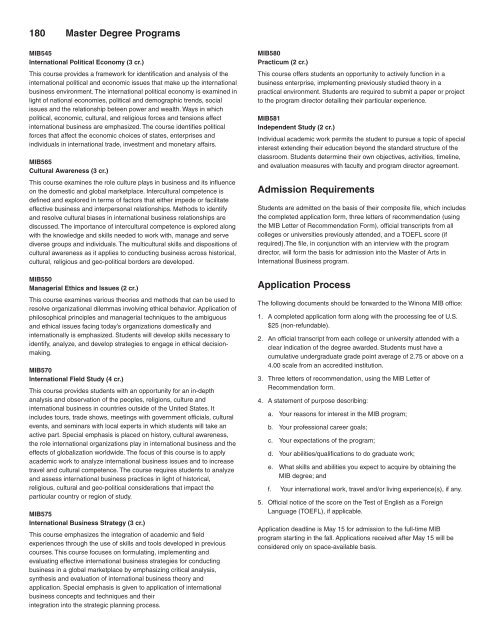& Student Handbook - Saint Mary's University of Minnesota
& Student Handbook - Saint Mary's University of Minnesota
& Student Handbook - Saint Mary's University of Minnesota
You also want an ePaper? Increase the reach of your titles
YUMPU automatically turns print PDFs into web optimized ePapers that Google loves.
180 Master Degree Programs<br />
MIB545<br />
International Political Economy (3 cr.)<br />
This course provides a framework for identification and analysis <strong>of</strong> the<br />
international political and economic issues that make up the international<br />
business environment. The international political economy is examined in<br />
light <strong>of</strong> national economies, political and demographic trends, social<br />
issues and the relationship beteen power and wealth. Ways in which<br />
political, economic, cultural, and religious forces and tensions affect<br />
international business are emphasized. The course identifies political<br />
forces that affect the economic choices <strong>of</strong> states, enterprises and<br />
individuals in international trade, investment and monetary affairs.<br />
MIB565<br />
Cultural Awareness (3 cr.)<br />
This course examines the role culture plays in business and its influence<br />
on the domestic and global marketplace. Intercultural competence is<br />
defined and explored in terms <strong>of</strong> factors that either impede or facilitate<br />
effective business and interpersonal relationships. Methods to identify<br />
and resolve cultural biases in international business relationships are<br />
discussed. The importance <strong>of</strong> intercultural competence is explored along<br />
with the knowledge and skills needed to work with, manage and serve<br />
diverse groups and individuals. The multicultural skills and dispositions <strong>of</strong><br />
cultural awareness as it applies to conducting business across historical,<br />
cultural, religious and geo-political borders are developed.<br />
MIB550<br />
Managerial Ethics and Issues (2 cr.)<br />
This course examines various theories and methods that can be used to<br />
resolve organizational dilemmas involving ethical behavior. Application <strong>of</strong><br />
philosophical principles and managerial techniques to the ambiguous<br />
and ethical issues facing today’s organizations domestically and<br />
internationally is emphasized. <strong>Student</strong>s will develop skills necessary to<br />
identify, analyze, and develop strategies to engage in ethical decisionmaking.<br />
MIB570<br />
International Field Study (4 cr.)<br />
This course provides students with an opportunity for an in-depth<br />
analysis and observation <strong>of</strong> the peoples, religions, culture and<br />
international business in countries outside <strong>of</strong> the United States. It<br />
includes tours, trade shows, meetings with government <strong>of</strong>ficials, cultural<br />
events, and seminars with local experts in which students will take an<br />
active part. Special emphasis is placed on history, cultural awareness,<br />
the role international organizations play in international business and the<br />
effects <strong>of</strong> globalization worldwide. The focus <strong>of</strong> this course is to apply<br />
academic work to analyze international business issues and to increase<br />
travel and cultural competence. The course requires students to analyze<br />
and assess international business practices in light <strong>of</strong> historical,<br />
religious, cultural and geo-political considerations that impact the<br />
particular country or region <strong>of</strong> study.<br />
MIB575<br />
International Business Strategy (3 cr.)<br />
This course emphasizes the integration <strong>of</strong> academic and field<br />
experiences through the use <strong>of</strong> skills and tools developed in previous<br />
courses. This course focuses on formulating, implementing and<br />
evaluating effective international business strategies for conducting<br />
business in a global marketplace by emphasizing critical analysis,<br />
synthesis and evaluation <strong>of</strong> international business theory and<br />
application. Special emphasis is given to application <strong>of</strong> international<br />
business concepts and techniques and their<br />
integration into the strategic planning process.<br />
MIB580<br />
Practicum (2 cr.)<br />
This course <strong>of</strong>fers students an opportunity to actively function in a<br />
business enterprise, implementing previously studied theory in a<br />
practical environment. <strong>Student</strong>s are required to submit a paper or project<br />
to the program director detailing their particular experience.<br />
MIB581<br />
Independent Study (2 cr.)<br />
Individual academic work permits the student to pursue a topic <strong>of</strong> special<br />
interest extending their education beyond the standard structure <strong>of</strong> the<br />
classroom. <strong>Student</strong>s determine their own objectives, activities, timeline,<br />
and evaluation measures with faculty and program director agreement.<br />
Admission Requirements<br />
<strong>Student</strong>s are admitted on the basis <strong>of</strong> their composite file, which includes<br />
the completed application form, three letters <strong>of</strong> recommendation (using<br />
the MIB Letter <strong>of</strong> Recommendation Form), <strong>of</strong>ficial transcripts from all<br />
colleges or universities previously attended, and a TOEFL score (if<br />
required).The file, in conjunction with an interview with the program<br />
director, will form the basis for admission into the Master <strong>of</strong> Arts in<br />
International Business program.<br />
Application Process<br />
The following documents should be forwarded to the Winona MIB <strong>of</strong>fice:<br />
1. A completed application form along with the processing fee <strong>of</strong> U.S.<br />
$25 (non-refundable).<br />
2. An <strong>of</strong>ficial transcript from each college or university attended with a<br />
clear indication <strong>of</strong> the degree awarded. <strong>Student</strong>s must have a<br />
cumulative undergraduate grade point average <strong>of</strong> 2.75 or above on a<br />
4.00 scale from an accredited institution.<br />
3. Three letters <strong>of</strong> recommendation, using the MIB Letter <strong>of</strong><br />
Recommendation form.<br />
4. A statement <strong>of</strong> purpose describing:<br />
a. Your reasons for interest in the MIB program;<br />
b. Your pr<strong>of</strong>essional career goals;<br />
c. Your expectations <strong>of</strong> the program;<br />
d. Your abilities/qualifications to do graduate work;<br />
e. What skills and abilities you expect to acquire by obtaining the<br />
MIB degree; and<br />
f. Your international work, travel and/or living experience(s), if any.<br />
5. Official notice <strong>of</strong> the score on the Test <strong>of</strong> English as a Foreign<br />
Language (TOEFL), if applicable.<br />
Application deadline is May 15 for admission to the full-time MIB<br />
program starting in the fall. Applications received after May 15 will be<br />
considered only on space-available basis.
















